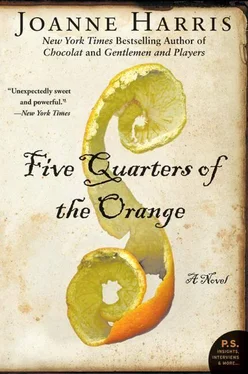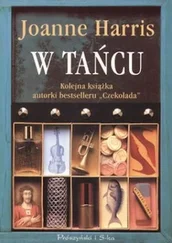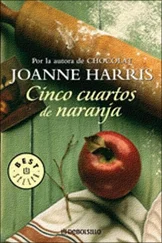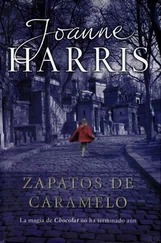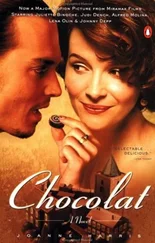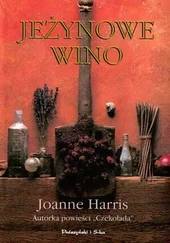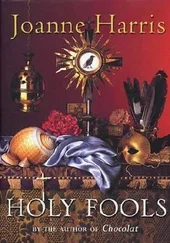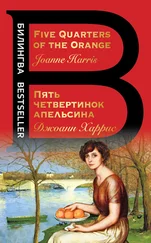A group of people by the side of the fountain began a cheery song. Raphaël was there, I think, and Colette Gaudin, and Paul’s uncle, Philippe Hourias-a yellow scarf tied incongruously about his neck-and Agnès Petit in her Sunday frock and patent shoes, a crown of berries on her hair. I remember her voice rising above the others for a moment-it was untrained, but very sweet and clear-and I felt a shiver raise the hairs on the nape of my neck, as if the ghost she was to become had walked prematurely over my grave. I still remember the words she sang:
A la claire fontaine j’allais me promener
J’ai trouvé l’eau si belle que je m’y suis baignée
Il y a longtemps que je’t‘aime
Jamais je ne’t‘oublierai.
Tomas-if it had been Tomas-would be at the Lookout Post by now. But Paul at my side showed no sign of mingling with the crowd. Instead he looked at my mother’s figure across from the fountain and bit his lips nervously.
“I thought you said she wouldn’t b-be here,” he said.
“I didn’t know,” I said.
We stood watching for a while as people refreshed themselves. There were jugs of cider and wine resting on the ledge around the fountain, and many of the women had, like my mother, brought loaves and brioche and fruit to distribute at the church door. I noticed that my mother kept her distance, though, and few came near enough to claim the food she had so carefully prepared. Her face remained impassive, however, almost indifferent. Only her hands gave her away, her white, nervous hands clenched so tightly against the basket’s handle. Her lips were bitten white against her pale face.
I fretted. Paul gave no sign of leaving my side. A woman-Francine Crespin, I think, Raphaël’s sister-held out a basket of apples to Paul, then, seeing me, let her smile stiffen. Few people had missed the writing on the henhouse wall.
The priest came out of the church. Père Froment, his weak mild eyes bright today with the knowledge that his people were united, his gilt crucifix mounted on a wooden pole and held in the air like a trophy. Behind him, two altar boys carried the Virgin on her yellow-and-gold dais decorated with berries and autumn leaves. The Sunday-schoolers turned to the little procession with their candles held in the air and began to sing a harvest hymn. Girls primped and practiced their smiles. I saw Reinette turn too. Then came the harvest queen’s yellow throne, carried out from the church by two young men. Only straw after all, with head and armrests made of corn sheaves and a cushion of autumn leaves. But for a moment with the sun shining on it, it might just as easily have been gold.
There were maybe a dozen girls of the right age waiting by the fountain. I remember them all: Jeannette Crespin in her too-tight communion dress, redheaded Francine Hourias with her mass of freckles that no amount of washing with bran could fade, Michèle Petit with her tight braids and eyeglasses. None of them could hold a candle to Reinette. They knew it too. I could see it in the way they watched her, set slightly apart from the others in her red dress with her long hair unbound and berries woven into her curls, with envy and suspicion. With a little satisfaction too: no one would vote for Reine Dartigen as harvest queen this year. Not this year, not with the rumors flying about us like dead leaves in the wind.
The priest was speaking. I listened with mounting impatience. Tomas would be waiting. I had to leave soon if I was not to miss him. At my side Paul was staring at the fountain with that look of half-stupid intensity in his face.
“It has been a year of many trials…” His voice was a soothing drone, like the distant bleating of sheep. “But your faith and your energy have brought us through once again.” I sensed impatience akin to mine from the people in the crowd. They had already listened to a long sermon. Now was the time for the crowning of the queen, for the dancing and the celebration. I saw a small child reach for a piece of cake from her mother’s basket and eat it quickly, unnoticed, behind her hand, with furtive, greedy bites.
“Now is a time for celebration.” That was more like it. I heard a low shushing from the crowd, a murmur of approbation and impatience. Père Froment felt it too.
“I only ask that you show moderation in all things,” he bleated, “remembering who it is that you are celebrating-without Whom there could be no harvest and no rejoicing-”
“Get on with it, Père! ” cried a rough, cheery voice from the side of the church. Père Froment looked affronted and resigned at the same moment.
“All in good time, mon fils ,” he admonished. “As I was saying…now is the time to begin our Lord’s festival by naming the harvest queen-a girl between the ages of twelve and eighteen-to rule over our celebrations and to wear the barley crown-”
A dozen voices interrupted, crying out names-some of them quite ineligible. Raphaël yelled out “Agnès Petit!” and Agnès, who wasn’t a day under thirty-five, blushed in delighted embarrassment, looking for a moment almost pretty.
“Mireille Dupré!”
“Colette Gaudin!” Wives kissed their husbands and shrieked mock indignation at the compliment.
“Michèle Petit!” That was Michèle’s mother, doggedly loyal.
“Georgette Lemaître!” This was Henri volunteering his grandmother, aged ninety or more and cackling wildly at the joke.
Several young men called out for Jeannette Crespin, and she blushed furiously behind her hands. Then Paul, who had been standing in silence at my side, suddenly stepped forward.
“Reine-Claude Dartigen!” he called loudly, without stammering, and his voice was strong and almost adult, a man’s voice, quite unlike his own slow, hesitant drawl. “Reine-Claude Dartigen!” he called again, and people turned to look at him curiously, murmuring. “Reine-Claude Dartigen!” he called once more, and walked across the square toward the astounded Reinette with a necklace of crab apples in his hand.
“Here. This is for you,” he said in a softer voice-but still with no trace of a stutter-and flung the necklace over Reinette’s head. The little red-and-yellow fruit glowed in the reddish October light.
“Reine-Claude Dartigen,” said Paul for the fourth time, and, taking Reine’s hand, led her the few steps to the straw throne. Père Froment said nothing, an uneasy smile on his lips, but allowed Paul to place the barley crown on Reinette’s head.
“Very good,” said the priest said softly. “Very good.” Then, in a louder voice; “I hereby name Reine-Claude Dartigen this year’s Harvest Queen!”
It might have been impatience at the thought of so much wine and cider waiting to be drunk. It might have been the surprise of hearing poor little Paul Hourias speak without stammering for the first time in his life. It might have been the sight of Reinette sitting on the throne with her lips like cherries and the sun shining through her hair like a halo. Most of the villagers clapped. A few even cheered and called out her name-all of them men, I noticed, even Raphaël and Julien Lanicen, who had been at La Mauvaise Réputation that night. But some of the women did not applaud. Only a few abstained, only a handful, but enough. Michèle’s mother, for one, and spiteful gossips like Marthe Gaudin and Isabelle Ramondin. But they were still few, and although some looked uneasy they joined their voices to the rest-some even clapped as Reine threw flower heads and fruit from her basket at the Sunday-schoolers. I caught a glimpse of my mother’s face then as I began to creep away, and was struck by the sudden look on her face, the sudden soft, warm look-cheeks flushed and eyes almost as bright as in the forgotten wedding photograph-the scarf pulling from her hair as she almost ran to Reinette’s side. I think I was the only one to see it. Everyone else was looking at my sister. Even Paul was looking at her from his place at the side of the fountain, the stupid look back on his face as if it had never left. Something inside me twisted. Moisture stung my eyes so sharply that for a second I was sure that some insect-a wasp, perhaps-had landed on my eyelid.
Читать дальше
